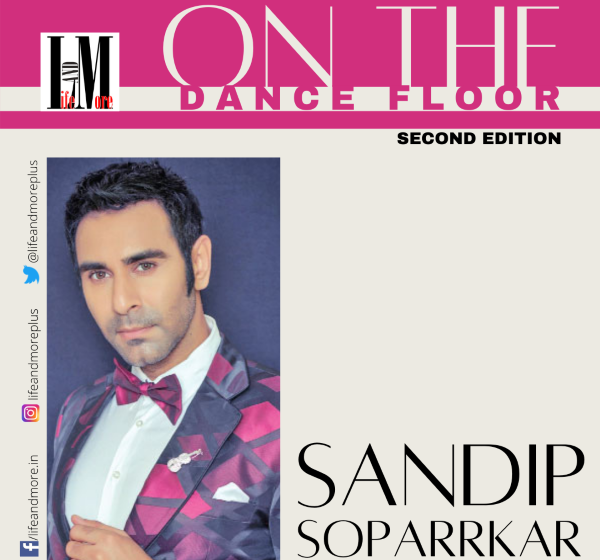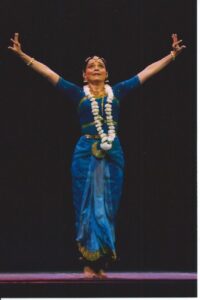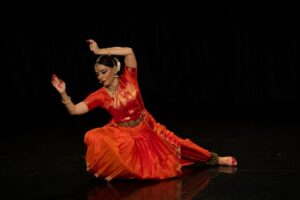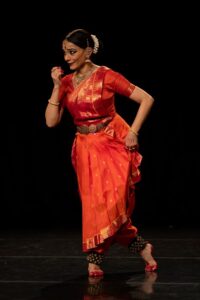Malavika Sarukkai celebrates her Golden Jubilee at NCPA

Malavika Sarukkai seemed to have paved a way back into the world by being a student of dance, again. The Padma Shri awardee completed 50 glorious years in dance. Her new solo performance, Anubandh – Connectedness, is a call for hope. The artiste implored her audiences to navigate sorrow and solace through their primordial ties with nature. The show at the National Centre of Performing Arts (NCPA), Mumbai left the audience spellbound.
Sarukkai was born in 1959 in Tamil Nadu. She began learning Bharatanatyam at the age of seven and trained under Kalyanasundaram Pillai (Tanjavur school) and Rajaratnam (Vazhuvoor School) She also learned abhinaya under Kalanidhi Narayanan and Odissi under renowned gurus, Kelucharan Mohapatra and Ramani Ranjan Jena. She made her debut at the age of 12 at NCPA, Mumbai and she celebrated her golden year on stage again at the same venue.

The Sangeet Natak Akademi Awardee has performed at many places in India and abroad, including the Lincoln Center for the Performing Arts, New York, John F. Kennedy Center for the Performing Arts among others. Her life and work have been recorded by way of a documentary, Samarpanam, commissioned by the Government of India. She also features in a nine-hour television documentary by BBC/WNET under the title, Dancing.The Unseen Sequence – Exploring Bharatanatyam Through the Art of Malavika Sarukkai is another documentary made on her art. After her recent show, the elated Sarukkai spoke about her experience of concluding celebrated golden years, excerpts from the interview:
Fifty glorious years, when you look back how has the journey been?
My journey in dance has been incredible, unbelievable. Destiny has played an important role as otherwise I could not have continued on this dance marathon and without the benediction of divine grace, many things could not have fallen in place. Classical dance required of me decades of sustained practise. This demanded stamina at the physical, emotional and spiritual levels. Together with this, life also had its ups and downs, highs and lows which had to be constantly navigated. Through all this dance kept my spirit alive as it granted me a world of discovery for which I am ever grateful. The world of dance changed the way I looked at life, people, nature. It granted me a new dimension to my life.

Your first show was at NCPA and now the golden jubilee celebration too is on the same stage, what is the feeling like?
I grew up and went to school in Bombay (now Mumbai) and had my Arangetram (first public performance) in 1972. And so, returning to NCPA in Mumbai is special in this significant year. As an artist, I have felt welcomed at NCPA because of the vibrant diversity of programs presented at the complex. I have always looked forward to presenting my art and curated my programs with care keeping in mind the discerning audience. Over the years I have presented my art at The Little Theatre, The Tata Theatre and at The Jamshed Bhabha Theatre. Each space at NCPA is different, offering its unique possibility of engaging with the audience. The experience of dancing has been rewarding, complemented as it is by many memories.
Tell me more about your show AnuBandh – Connectedness?
This show is my response to the isolation, loneliness and trepidation arising from the pandemic. At a time, uncertainty in a fractured world, it is my call to the transformative power of hope. Anubandh seeks to recognise and reclaim our primordial relationship with the Sun and the Moon, as also with Panch Mahabhuta (the Five Great Elements) as theu are honoured in India: Prithvi (Earth), Apah (Water), Agni (Fire), Vayu (Wind) and Akasha (Space).
Through my show I invited my audience to a journey from familiar to the unfamiliar, from the known to the unknown. My performance moved from the personal to the shared and from the individual to the collective. The dance reinforced our deep links with the great elements – the generosity of the earth, the rejuvenating power of the water, the caressing sukha (pleasure) of the wind, the unending depth of dukkha (sorrow) of fire, the wonderment in sensing space and knowing that the same prana (life-breath) pervades all. In short Anubandh – Connectedness explored the essential relationship between Nature and our lives.
In this incredible journey who has been the most inspirational person for you and why?
Dance is a marathon specially when it stretches over decades. Without inspiration, passion, motivation and hard work it’s impossible to sustain the challenges one faces as an artist. Without question, the most inspirational person in my dance journey was my mother, Saroja Kamakshi. She was a guiding spirit through the many challenges I faced and she fulfilled several roles – creative collaborator, researcher, manager, mother and spiritual guide. We shared a most unique relationship.

There has been a drastic change in the way performers and students were when you started to now, how do you feel about it?
There has been a huge shift in the practise and presentation of the performing arts in the last few decades. Change is natural in any art form but I think as artists and as a society we need to be alert and intelligent to analyse what are the positive and negative learnings. I believe we need to take the practise of classical dance not in a superficial way but as a serious study. Otherwise on the long run we will only produce dancers not artists. Without the contribution of artists to the world of dance, as a society we will be the poorer for it and that would be a shame considering we have inherited such a rich legacy. Classical dance can be practised, performed and viewed at multiple levels. It is up to us to choose what we wish to gain as artists or viewers from the experience of classical dance. If we allow ourselves to immerse in classical dance, it offers us deep perspectives, else it can be viewed as mere entertainment. Our approach defines what we receive.
What are your future plans?
Dance continues to inspire me in many ways. The more I create the more creative space unfolds. As long as I am inspired, I will continue to create path breaking dance productions in the language of Bharatanatyam, I will continue writing on dance, speaking about dance, disseminating an awareness of classical dance and continue mentoring a few serious dancers. Engaging and exploring dance will be an enduring and intrinsic part of my life

